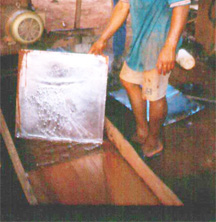Differences of opinion appear to be surfacing between the Guyana Gold and Diamond Miners Association (GGDMA) and the World Wildlife Fund (WWF) over the role of mercury in the mining sector as the local secretariat of the international conservation agency seeks to throw its weight behind global initiatives to ban the use of mercury in the mining sector.

The local mining sector is unlikely to shift to mercury-free mining methods when bans on mercury exports by the 27-member European Community and the United States come into effect from 2011 and 2013, respectively.
While Europe and the United States cumulatively produce most of the world’s mercury supplies, Stabroek Business understands that supplies of mercury to the local mining industry are relatively small and are secured primarily from Brazil. Those supplies, apart from being adequate for use by the mining industry here are unlikely to be affected by the European and American export bans.
The WWF is actively promoting the eradication of mercury use in the mining sector here in the wake of concerns over its effects on the environment, mining communities and the miners themselves. Recently, WWF facilitated a visit to French Guiana by officials of the Guyana Geology and Mines Commis-sion (GGMC) and the GGDMA to observe mercury-free mining methods there.
Executive Secretary of the GGDMA Edward Shields who visited French Guiana with the local delegation told Stabroek Business that the association supported efforts to remove the environmental hazards in the mining sector. Shields said, however, that the issue was much more complicated than the banning of mercury in the local mining sector since, unlike in French Guiana, mercury was important as an amalgam for gold.
He explained that unlike in French Guiana where gold is mined in much larger quantities and where the yield could be as high as two kilos per day local miners relied on what he described as “fines” – smaller particles of gold – to accumulate far smaller quantities of the precious metal. “Mercury is used as an amalgam to secure those fines. Because of the smaller quantities of gold secured by the miners here they cannot afford to ignore those fines,” he added.
Local miners have come under official scrutiny for excessive mercury use and other transgressions and Shields conceded that there were cases in which mercury was being illegally used in sluice boxes and in the ‘spiking” of pits.
According to Shields the mining sector in French Guiana was “much more efficiently structured” than the local mining industry. “Environ- mental concerns, particularly issues of land reclamation are priority issues in the industry in French Guiana. The industry there is also much better supported by the French Government in terms of the financing of mining laboratories and the management of data. Additionally, there are fewer miners in French Guiana than there are here,” Shields said.
Meanwhile, according to Shields, moves to regularize the importation and use of mercury in Guyana will shortly be strengthened through the introduction of a system that will require importers to secure licences for mercury imports. At the moment there is no licensing requirement for the importation of mercury.
Last July the GGDMA secured $5.6m from the WWF to provide training to miners in improved tailings management.
